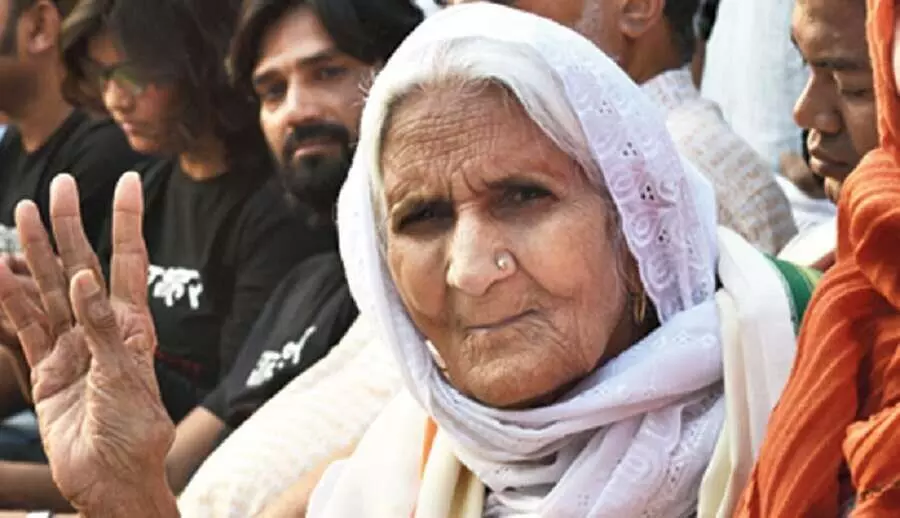
India belongs to Bilkis Dadi too
text_fieldsThe '100 Most Influential People, 2020', published by globally reputed Time magazine, is seen as a document on formation of public opinion around the world. This year's listing contains three personalities from India: together with prime minister Narendra Modi and Bollywood actor Ayushmann Khurrana come the name of Bilkis, the 82-year old woman, who had become the very face of the Shaheen protest in Delhi. For Narendra Modi, the more sombre reaction now may be, more than the gratification of having found a place in the list, the implied blow of Bilkis Dadi also being ranked in it. The list can also be seen as an indictment of the malicious intent to denigrate a section of the country's population by denying them even citizenship – for it was the agitation to resist that discriminatory citizenship legislation which Bilkis Dadi symbolised through her age-defying role in it.
While it can never be argued that being listed in Time's ranking is the ultimate yardstick of eminence of a personality. Bu in the current global opinion-forming process, it does play an important part. Finding a place in the ranking does not bear any testimony for Bilkis Dadi's leadership qualities or capabilities. But on the other hand, it holds a mirror to the way the world perceived the popular protests that stood up against the Citizenship Amendment Act (CAA). As a matter of fact, the anti-CAA strike was a setback for the BJP government, which on the back of its predominant majority in the parliament, and even without an Opposition worth the name, had been running amok with items of its divisive agenda one after another. The government and its backer, the sangh parivar movement were then sitting pretty confident that a weakened opposition composed of the Congress, a listless left wing and the secular parties, were incapable of doing anything against the well-entrenched central regime. It was this situation that emboldened it to get the CAA passed throwing to the winds all fundamental principles of India's constitution. But what followed was a picture of protests started by students in Aligarh and Jamia Millia universities, soon taken up by nearly the entire country. And that evolved into the biggest popular resistance movement ever witnessed by the country since independence. The Modi regime thus found itself heading to the worst political crisis. It forced the government to go back on its vow to move from CAA to the National Register of Citizens (NRC) - which by undeclared design would deprive a large chunk of the population of its claim to citizenship. It was quite an unusual juncture for the sangh parivar to kneel before a popular agitation with the initiative of an oppressed and weak Muslim community.
The anti-CAA movement caused major reverberations, not only in the country, but across the world. In several world capitals and major cities, rallies were held against the CAA. Those were days when India lost its face before the international community, and with major damage to its image as the world's largest democracy. But neither the Modi government, nor his party the BJP, was ready to accept any of such reality. Despite the most brutal attempts to crush the protests using the entire government machinery, it could not do anything effective. Finally what came to the rescue of the government was the eruption of the Covid pandemic, forcing a respite for the gatherings. Bilkis Dadi's inclusion in Time's list is a manifestation of how the international community views the anti-CAA protests, and marks the world's tribute to the tenacity of the protests, a virtual blow to a prime minister working on the ego-driven notion that he was the nation. It is imperative for him to recognise that India means not only him, but also Bilkis.
Following the Covid pandemic, much of the government's day-do-day functioning remained handicapped. But this window of lull was used by the Modi-Amit Shah duo to hunt down those involved in the anti-CAA protests. Thus, the Centre got busy going after the student leaders who were in the forefront of the anti-CAA stir, by framing them under false charges about the riots which followed the protests and by arresting them under the draconian UAPA (Unlawful Activities Prevention Act). Many of those student leaders are still in jail at the time of writing this. The earlier the BJP regime realises that such anti-democratic moves will ultimately weaken our country itself, the better. Probably, Time magazine's list can act as a good reminder about this.


















